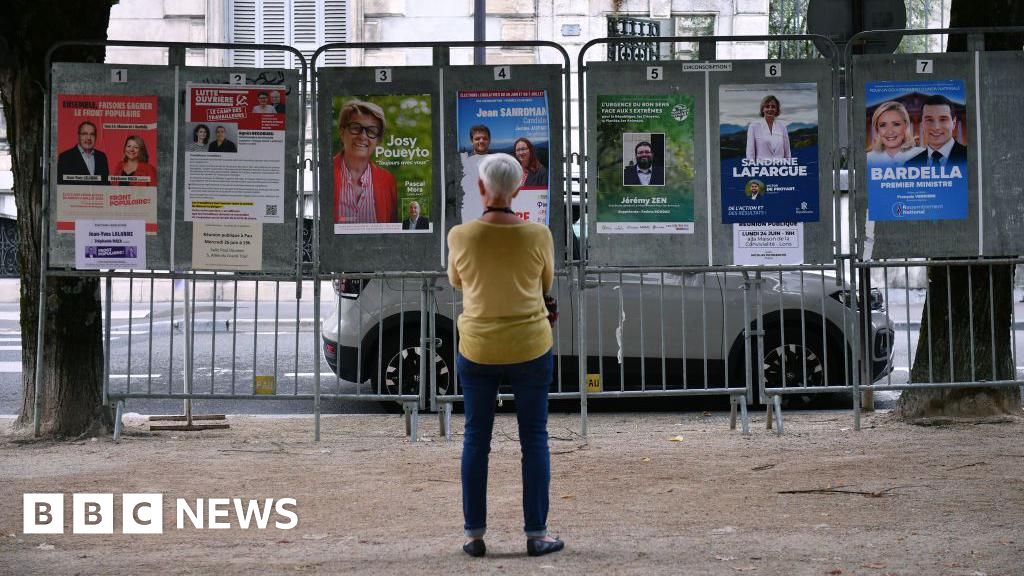France election: Third-place candidates withdraw in bid to block far right

The deadline for declarations in the French elections ended Tuesday, with large numbers of left and centre candidates standing aside in order to try to block the far-right National Rally (RN).
Parties had till 18:00 local time (17:00 GMT) to register contenders for Sunday’s second round of parliamentary elections.
With no official list yet released, French media reported that between 214 and 218 third-placed contenders had pulled out of the race in their constituencies. It means there will now be around 108 three-way races, instead of just over 300.
The rest will be two-way run-offs, apart from in two constituencies where four candidates qualified.
Last Sunday’s first round produced a big victory for the party of Marine Le Pen, which – with allies – won around 33% of the vote.
A broad left-wing alliance came second, and President Emmanuel Macron’s centrists third.
But Ms Le Pen’s chances of winning an outright majority in the 577-seat National Assembly have been dented by the blocking tactics of her party’s enemies.
Where third-placed centre or left candidates pull out, the anti-RN vote is focused on a single candidate, making victory easier over the RN contender.
The leftwing New Popular Front (NPF) – which comprises everyone from centre-left social democrats to far-left anti-capitalists – issued instructions to all of its third-placed candidates to step down and let a centrist reap the anti-RN vote.
The NPF is thus helping two senior pro-Macron MPs – former prime minister Elisabeth Borne and Interior Minister Gérald Darmanin – to win in their constituencies in Normandy and the north.
Conversely a pro-Macron candidate has stood down in order to help radical leftwinger François Ruffin defeat the RN candidate in the northern city of Amiens.
The RN’s 28 year-old president and hopeful for prime minister Jordan Bardella condemned these arrangements as the fruit of an “alliance of dishonour” between parties that had until now been at each other’s throats.
Instructions to candidates from Macron’s centrist bloc have been more ambiguous than the NPF’s.
Though Macron himself and Prime Minister Gabriel Attal have called for “no vote for the RN”, some in his camp believe its far-left component makes the NPF equally unpalatable.
Senior figures like Finance Minister Bruno Le Maire and former prime minister Edouard Philippe – both originally from the centre-right – are refusing to issue instructions to vote systematically against the RN.
RN leaders have said they will not attempt to form a government unless they are given an outright majority in the parliament in Sunday’s vote. They say they do not want to be given the appearance of power, if the reality is they cannot pass laws.
However on Tuesday Marine Le Pen appeared to qualify this, when she said that a lower majority would be good enough – if it does not fall too far short of the 289 member threshold.
Speaking on French radio she said that winning around 270 deputies would allow her party to open talks with individual MPs from other groups in the hope of persuading them into an accord.
“We are going to say to them:’ Are you ready to participate with us in a new majority? Are you ready to vote a confidence motion? Are you ready to vote for the budget?’” she said.
She cited as possible targets independent MPs of right and left, and part of the conservative Republicans party which won 10% of the vote on Sunday.
If the RN wins an absolute majority on Sunday, Bardella would be asked by President Macron to form a government – and there would then begin a tense period of “cohabitation” between two political enemies.
Under the French Fifth Republic constitution, power would flow away from Macron to the prime minister’s office because “the government determines and conducts the policy of the nation”.
However Mr Macron would probably seek to retain powers in the areas of foreign policy and defence, which from precedent – and not from the actual wording of the constitution – have remained the preserve of the Elysée in past cohabitations.
Marine Le Pen also accused the president Tuesday of carrying out an “administrative coup d’état” because she had heard he was preparing a number of key appointments in the police and army just days ahead of the vote.
“When you want to counter the results if an election by nominating your people to jobs, and when that stops [the government] from being able to carry out policies which the French people have asked for …. I call that an administrative coup d’état,” she said.
“I hope it is only rumour,” she added.
Related
European leaders push defense spend amid uncertainty over Trump aid…
This week, the European Commission proposed measures for fiscal flexibility on defense spending and a plan to borrow 150 billion euros ($163 b
Europe rallies behind Zelensky as US announces new talks with…
EU leaders rallied around Ukraine and agreed to boost the bloc's defences at a crisis summit Thursday, as Washington said talks with Kyiv were back on track
European markets recoup most losses; Autos gain on tariff exemption
This was CNBC's live blog covering European markets. European markets ended around the flatline on Thursday after a choppy day of trading as i
Jesse Eisenberg Granted Polish Citizenship: ‘I Am Happy to Be…
Jesse Eisenberg has been granted Polish citizenship by the European country’s president, just months after the actor, writer and director applied.Eisenberg wa












